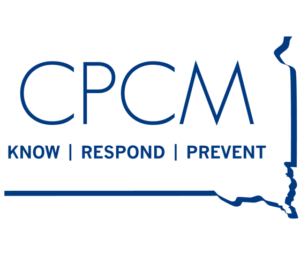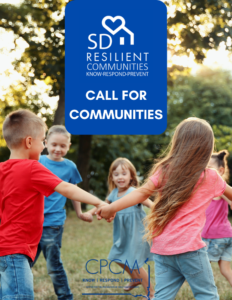Resilient Communities: Call for Communities
About the Center for the Prevention of Child Maltreatment
Established by the South Dakota Legislature in 2017, CPCM aims to align local, tribal, state and federal efforts to protect children. CPCM uses the CDC’s Adverse Childhood Experiences (ACEs) prevention framework.
Child maltreatment prevention and response is complex. Responsibility for prevention efforts and corresponding promotion of child wellbeing is shared across multiple agencies and programs. SD Resilient Communities brings unity to local efforts.
Opportunity Overview
This opportunity and corresponding funding has passed. To view current information about Resilient Communities, visit https://sdcpcm.com/our-work/resilient-communities/.
CPCM is requesting applications from communities interested in organizing facilitating teams to lead Resilient Communities–a community-led initiative to prevent adversity and childhood maltreatment throughout South Dakota. CPCM will work with all communities to provide technical assistance to aid in the capacity to know about, respond to, and prevent childhood maltreatment and Adverse Childhood Experiences (ACEs) as well as how to increase Positive Childhood Experiences (PCEs).
SD Resilient Communities is designed to come alongside other initiative and to work with existing coalitions communities may already have established.
Funding
Any community may indicate interest and receive technical assistance, but 6 communities in Eastern SD will be selected in 2023 to also receive funding for programming and to pilot a Resilient Communities cohort/hub model.
South Dakota Resilient Communities Aims To
Support South Dakota communities to increase their cross-sector capacity to know, prevent, respond to, and sustain evidence-based strategies to reduce Adverse Childhood Experiences (ACEs), increase Positive Childhood Experiences (PCEs) and build more resilient, self-healing communities.
Increase awareness and facilitate education on Adverse Childhood Experiences (ACEs) and Resiliency.
Increase awareness of the signs and prevalence of child maltreatment and how to work in cross-sector and multidisciplinary teams to prevent and respond to it.
Connect South Dakota communities to evidence-based resources and trainings available at no or low-cost in our state that can reduce risk factors and increase protective factors for children.
Move from individual responsibility to collaborative, community solutions.
Build a coalition of Resilient Communities in South Dakota that can support and learn from one another. Together, we are stronger!
Requirements
Participating communities will:
- Form a Facilitating Team of 3-5 people, each from a different sector, who are committed to leading their community through the Resilient Communities process.
- Teams will:
- Complete a 3-4 hour ACE Interface training.
- Choose 2 members to take ACE Interface Presenter training (8 hours).
- Plan and host an initial community-wide ACE Interface training, with support from a Master Trainer and CPCM.
- Facilitate monthly community meetings and lead discussions designed to uncover community strengths and collaborative opportunities to reduce ACEs and increase PCEs.
- All Teams will also be expected to:
- Attend regular TA calls with CPCM staff and participate in online opportunities to meet other ACE Interface presenters across the state.
- Attend 2-3 “Resilient Community Hub” meetings to learn from and alongside facilitating teams from neighboring communities.
- Follow SD Resilient Communities marketing guidelines.
- Participate in Resilient Communities evaluation efforts so that CPCM can make quality improvements to the program.
- In addition to the above, the six teams selected to help pilot the Resilient Communities Hub/Cohort model will be expected to:
- Attend 2-3 “Resilient Community Hub” meetings to learn from and alongside facilitating teams from neighboring communities.
Notes
The goals of the Resilient Communities initiative are both to create shared knowledge and a vision, but also to help communities develop a place-based action plan that provides a way for all community members to effectively collaborate to prevent ACEs and increase PCEs. This process is designed come alongside other initiatives and work with existing coalitions your community may already have established.
CPCM values that every community is unique and believes in supporting communities in adapting and utilizing this tool to meet their unique cultural and place-based needs. The SD Resilient Communities approach is community-led and intends that the power and leadership that exists within communities to prevent ACEs and increase PCEs will develop and drive positive change. The process and outcome will be unique to each community, as defined by the community members, with the support of partnership and technical assistance from ACE Interface Master Trainers and CPCM.
The Resilient Communities Hub/Cohort opportunity is made possible through a BIG Grant from the South Dakota Community Foundation.


